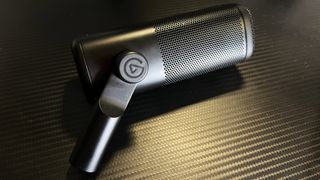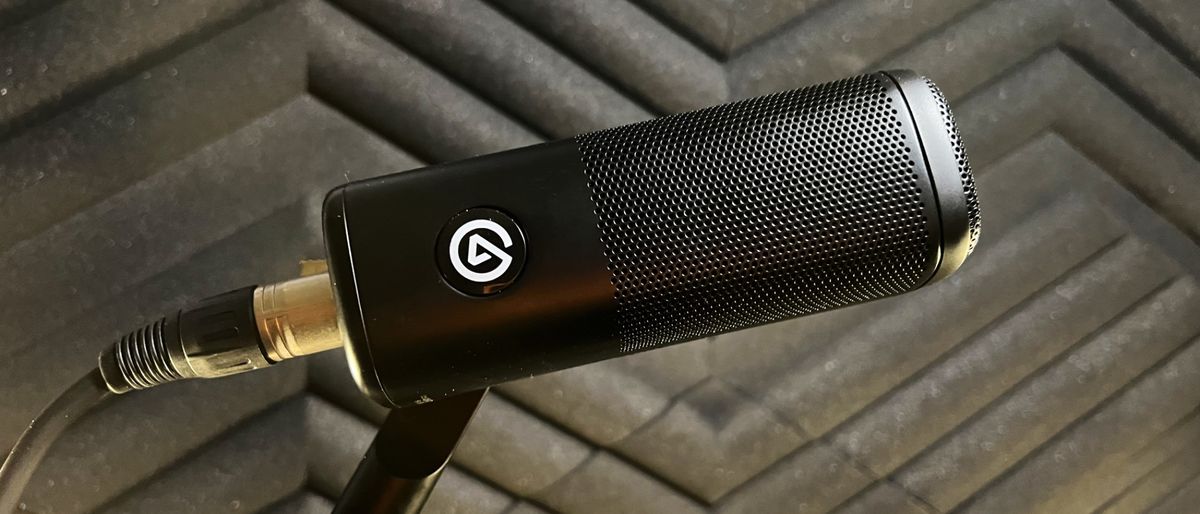12DOVE Verdict
The Elgato Wave DX is a great microphone and perfect for those looking to elevate their streams with a top-notch dynamic XLR microphone. Offering great audio, a premium design and build, and good value, there are very few negatives.
Pros
- +
Quality, balanced sound
- +
Tight form factor
- +
Integrates well with Elgato ecosystem
Cons
- -
No way to shock mount
- -
Doesn’t include a stand or cable
Why you can trust 12DOVE
Elgato’s range has rapidly expanded in recent years to tick just about every box on a streamers setup build list. Though previously there was a glaring omission from the lineup that’s now been plugged; a dynamic, XLR microphone.
Meet the Elgato Wave DX, a $99/£109 solution that promises performance well beyond its near entry-level price tag. We already consider the Wave:3 one of the best microphones for streaming in 2022, so Elgato has set its own bar high.
Design & features
Sitting right at home in Elgato's streaming for gamers gear lineup, the Wave DX design is refined and reserved with a minimum of fuss. If you’re a fan of Elgato’s sleek, pared-back aesthetic the Wave DX will impress, with a simple white logo the only thing breaking up the blackout. There’s not a single LED or flashy gamer touch in sight.
Overall it’s a surprisingly small unit, ignoring the mounting joint the entire body is less than 5.9"/15cm long and just 2"/5.3cm across, making it an excellent option for tighter setups. The all-black hardened steel chassis feels particularly premium and while there’s a reassuring amount of weight to the microphone, it’s nowhere near heavy enough to cause a problem for even low-end mic arms.
That’s a good thing too because you’ll need to invest in a mounting solution as there’s nothing included in the box. The mono swivel mount point offers nice clearance so should be universally compatible, and Elgato does include a couple of thread adapters, but it’s an added expense to make sure you consider when shopping.

The mount point is fully removable and can be attached on either side of the microphone, offering great flexibility for all setup layouts and I had no trouble finding a spot I was happy with. You can even swap and rotate the Elgato logo to keep it the right way up for your viewers on stream, if that’s your kind of thing.
There’s an integrated pop filter hiding inside the body, though I didn’t find this as effective as external solutions, particularly if you’re up close and looking for that deep podcast sound. There’s also no way to shock mount the Wave DX with little protection on this front, which does leave it susceptible to desk bumps.
Overall though the Wave DX offers a design and build quality that feels well beyond its $99/£109 price tag. However it’s also worth noting Elgato doesn’t include an XLR cable with the Wave DX, so you’ll need to source one separately or bundle it with their own $19.99/£19.99 3m cable.

Performance
Microphones are one of the more subjective parts of a streaming setup, everyone’s sound is unique and different microphones can be tuned to extremes on the spectrum. That’s not the case with the Elgato Wave DX though which does a remarkable job of sitting on the fence.
The one-line summary is pretty simple, the Elgato Wave DX sounds great and will suit most setups, even straight out of the box with no fiddling and tailoring of EQ settings.
With the DX, Elgato has engineered a dynamic microphone that doesn’t go over the top by reminding you it’s a dynamic microphone. It doesn’t hammer home that intensely smooth, close podcast host sound and instead offers a lighter touch. There’s a brightness to vocals and overall it sounds less rounded off than some other dynamic microphones I’ve tested.
Whether this is a pro or con is going to vary from one person to the next and will account for personal taste and the other elements of your setup. It’s also worth remembering we’re considering the specific and subjective characteristics of the sound here, not the overall quality. The Wave DX delivers objectively clear and premium audio, it’s a great mic.

Microphone etiquette is important to remember as the Elgato Wave DX does a good job of rejecting other audio and general room sounds. This is great for dialling back unwanted noise like mechanical gaming keyboard chatter but will harm the audio quality of those streamers who forget to address the microphone properly. It also goes some way to accommodating less-than-ideal setups, a great choice for streamers with no acoustic treatment in their space.
As you’d expect the Wave DX works perfectly with the rest of the Elgato ecosystem, integrating with the Elgato Wave Link software and Stream Decks. Wave Link offers intuitive control of EQ adjustments and while the out-of-the-box sound is strong it’s worth taking five minutes to have a play around.

Overall - Should you buy the Elgato Wave DX?
The Elgato Wave DX is an excellent choice for streamers looking for a high-quality dynamic XLR microphone. It delivers strong audio performance in a premium feeling package and when it comes to quality and value there’s little to complain about.
How we tested the Elgato Wave DX
I used the Elgato Wave DX as both a microphone for live streaming and for everyday tasks like Discord calls for a couple of weeks. It was connected via XLR through the Wave XLR interface and used Elgato’s default post-processing through the Wave Link app.
You can read more about our approach to gaming tech and products in the full 12DOVE Hardware Policy.
Round out your streaming setups with upgrades elsewhere: consider adding one of the best capture cards and the best webcams to make your streams shine.
Alex is a streamer who has been creating gaming content for over a decade, streaming on Twitch regularly across the last five years. With a degree in film and a background in sports media, you'll find him jumping between 60,000 seat stadiums and his Animal Crossing island (where he's growing pears, in case you were wondering).

Blood of Dawnwalker devs explain how the vampire RPG's "narrative sandbox" builds on what they were "known for crafting" in games like The Witcher 3

Persona and Metaphor: ReFantazio composer's new JRPG gets a Steam Next Fest demo, and it's basically a turn-based Metal Gear Solid

Avowed is nothing like Bethesda's RPGs, but The Elder Scrolls 6 should take inspiration from its combat
Most Popular






